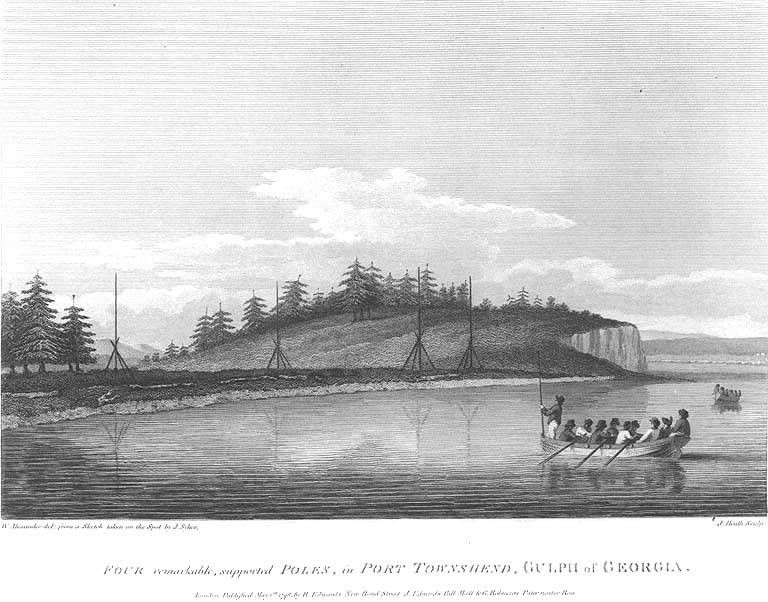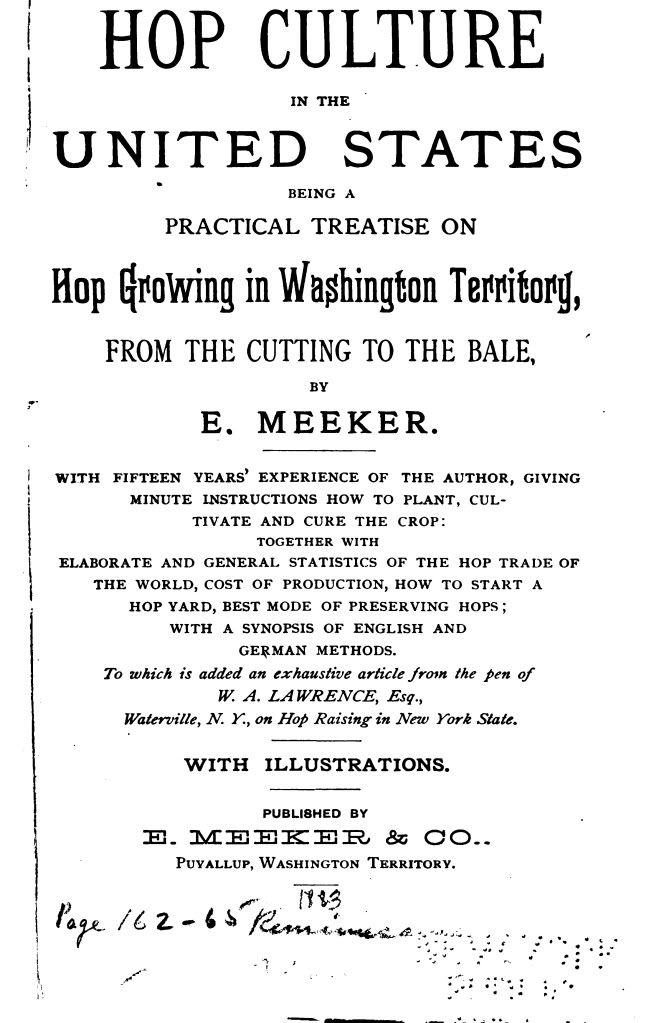(This post began as a response to the first in a series concerning Sam Wineburg,
Historical Thinking and Other Unnatural Acts (2001) on John Fea's blog:
The Way of Improvement Leads Home, "
Historical Thinking and Other Unnatural Acts--Part One.")
I teach adult students--minimum age is 25--in six week classes that usually meet twice per week for 3 1/2 hours (there's an option of once per week and two eight-hour Saturdays). I lecture too much in these classes. The lectures give me a sore throat, and are grueling endurance tests for the students, but they also stimulate innovative uses of PowerPoint.
A new class begins tonight: Pacific Northwest History. My usual first week lectures include a 42 slide presentation ("Inventing a Hinterland") and another 60 slide presentation ("Historiography and Colonization"). Both presentations offer up some gems, but can be deadly if I fail to engage the students in thinking historically.

I tend to get some mileage from images and text from George Vancouver's journal concerning some enigmatic poles. Vancouver died failing to comprehend their purpose, and I reveal the findings of ethnography only after considerable effort on the part of the students to comprehend their purpose from Vancouver's descriptions.
In the past, I have presented an extract from the pen of Captain James Cook as a photocopy with the title "hostilities expected":
During these visits they gave us no other trouble than to guard against their thievish tricks. In the morning of the 4th we had a serious alarm. Our party on shore, who were employed in cutting wood and getting water, observed that the natives all around them were arming themselves in the best manner they could, those who were not possessed of proper weapons preparing sticks and collecting stones. On hearing this I thought it prudent to arm also, but, being determined to act upon the defensive, I ordered our workmen to retreat to the rock upon which we had placed our observatories, leaving the natives in quiet possession of the ground. Our fears were ill- grounded. These hostile preparations were not directed against us, but against a body of their own countrymen, who were coming to fight them; and our friends of the sound, on observing our apprehensions, used their best endeavors to convince us that this was the case. We could see that they had people looking out on each point of the cove, and canoes frequently passed between them and the main body assembled near the ships. At length the adverse party, in about a dozen large canoes, appeared off the south point of the cove, when they stopped, and lay drawn up in a line of battle, a negotiation having commenced. Some people in canoes, in conducting the treaty, passed between the two parties, and there was some speaking on both sides. At length the difference, whatever it was, seemed to be compromised, but the strangers were not allowed to come alongside the ships, not to have any trade or intercourse with us. (Italics added)
James Cook, Captain Cook’s Voyages Round the World (1897), 427
It is a remarkable passage that should provoke a number of useful questions. I like to highlight the potential for miscommunication and misunderstanding. The novelty of Northwest Coast social and economic conventions, not yet understood by Cook and his crew (and probably not much understood at the end of their month in Nootka Sound) become evident in the expectations of attack when their "friends" are arming themselves against "strangers". Yet, Cook almost seems to comprehend that control of international trade was a central motivation for the threat of hostilities.
Even the name Nootka stems from misunderstanding. A separate handout has this passage alongside another from the same source. I label them "Nuu-chah-nulth orature".
So, the Chief told them to go out there again and see, you know. … They started making signs and they were talking and they were saying, ‘Nu-tka-icum.’ ‘Nu-tka- icum,’ they were saying. That means, ‘You go around the harbour [to find better anchorage].’ So Captain Cook said, ‘Oh. They’re telling us the name of this place is Nootka.’ That’s how Nootka got its name.
… But the Indian name is altogether different. …
We call white people ‘Muh-mul-ni’ because … they came in boats that looked high and strange to us, and muh-mul- ni means ‘houses on the water.’ Those people seemed to be in houses floating on the water.”
Mrs. Winnifred David, Sound Heritage, vol. 7 (1978); quoted in Ruth Kirk, Tradition and Change on the Northwest Coast (1986), 201
I generally try to get the students to frame some historical questions stemming from these passages. In place of their own questions, they usually leave with some of my generalizations about mutually beneficial trade and the failures on intercultural communication.
Tonight, students are receiving as photocopies the chapter in Cook's
A Voyage to the Pacific Ocean (1784) from which this passage is extracted. They are also receiving the
Sound Heritage article "The Contact Period as Recorded by Indian Oral Traditions," edited by Barbara S. Erfrat and W.J. Langlois that was Ruth Kirk's source for the brief extracts in her book.
When we meet for the second time, Wednesday, I will expect that they have read these twenty-five pages and written half a dozen questions that require research to answer.
My plan tonight is to start with the questions:
1. What is history?
2. Why does history merit our attention?
3. What are the boundaries of the Pacific Northwest?
All of these questions are addressed to an extent in my PowerPoint presentations, which we may or may not get to.







